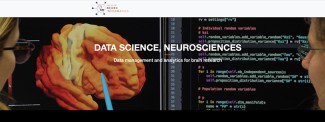The Centre for Neuroinformatics is a transverse structure in the Institute, gathering researchers, engineers, and IT people, united to promote excellence in data management, data analysis, and scientific computing across the whole Paris Brain Institute. The Centre for Neuroinformatics, a service provided by Paris Brain Institute.
Missions
Our core mission at the Brain Institute Centre for Neuroinformatics is to develop a common set of tools and processes to manage and analyse all kinds of neuroscience data. It allows any scientist from any domain to contribute to, and benefit from interoperable databases and a shared portfolio of methods and analytics tools.
We leverage all the data processing expertise distributed accross Brain Institute teams. In turn, we assist them in the developement of their research projects and offer training in all areas of data science.
Expertise
Data Management
We help teams and core facilities to implement standardised processes for data curation, annotation, de-identification and quality control in all areas of neuroscience research: genomics, electrophysiology, cellular imaging, neuroimaging, functional exploration and clinical observations.
Data Analysis
We assist teams in the analysis of their data. Our offer goes from mere consulting and training up to end-to-end studies. Our expertise spans biostatistics, mathematical modeling, and machine learning, especially for the integration of multimodal data. We also develop domain-specific processing tools, for instance in genomics.
Software Development
We develop software tools for the structuration and indexing of heterogeneous data sets. We also develop and maintain a portfolio of processing and analytics tools that may be triggered automatically or on-demand.
Scientific IT
Scientific IT sets up and maintains high performance servers, data storage, computing cluster and individual workstations with dedicated software for scientific computing.
Scientific events
We organise events, including our monthly meet-up “Café de la Neuroinformatique”, which federates the vibrant Brain Institute neuroinformatics community distibuted across all teams. We also organise international conferences and workshops.
Training
We offer training sessions for the Institute scientists in various areas of data science: code development and deployment on high performance computing cluster, usage of scientific software such as Matlab, Omero, REDCap or XNAT, good practices in data processing, statistical analysis and machine learning.
Events
Workshops and Conferences :
The Centre organises international scientific workshops, on several topics of interest for the neuroinformatics community.







